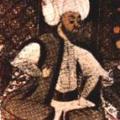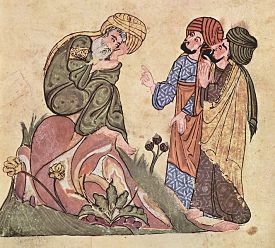122 - Founded in Translation: From Greek to Syriac and Arabic
Greek philosophy and science make their way into the Islamic world via Syriac and Arabic translations and interpretations.
Themes:
• P. Adamson, The Arabic Plotinus: a Philosophical Study of the “Theology of Aristotle” (London: 2002).
• C. D’Ancona, Recherches sur le Liber de Causis (Paris: 1995).
• G. Endress and R. Kruk (eds), The Ancient Tradition in Christian and Islamic Hellenism (Leiden: 1997).
• D. Gutas, Greek Thought, Arabic Culture: the Graeco-Arabic Translation Movement in Baghdad and Early Society (2nd-4th / 8th-10th centuries) (London: 1998).
• D. Gutas, Greek Philosophers in the Arabic Tradition (Aldershot: 2000).
• D. King, The Earliest Translation of Aristotle's Categories in Syriac (Leiden: 2010).
• F. Rosenthal, The Classical Heritage in Islam, trans. E. Marmorstein and J. Marmorstein (London: 1975).
• R. Walzer, Greek into Arabic: Essays on Islamic Philosophy (Oxford: 1962).
• J.W. Watt, “From Sergius to Matta: Commentary and Translation in Syriac Aristotelian and Monastic Tradition,” in J.W. Watt and J. Lössl (eds), Interpreting the Bible and Aristotle in Late Antiquity (Aldershot: 2011), 239-58.
Stanford Encyclopedia: Greek Sources in Arabic and Islamic Philosophy
In Our Time: Translation Movement (interview with Peter, Peter Pormann, Amira Bennison)
Philosopher's Zone: Greek Meets Arabic (Peter interviewed by the late Alan Saunders)







Comments
Inspiration
I just wanted to note that the section on Syriac philosophers is to some extent based on papers I attended in December, 2012, given by John Watt and Daniel King, both of Cardiff University (and of course on their publications, for which see the bibliography above). The discussion of the Greek-Arabic translation movement is, inevitably, much influenced by Dimitri Gutas' Greek Thought, Arabic Culture; again, see above.
The Translation Movement
RE: The Plotinian One and the Arabic Translations.
Thanks for this explanation: that the Arabic Plotinus refers to the first principle as the Creator and ESP. that the Plotinian absolute is defined more in terms of the subsidiary hypostasis, the Nous / Intellect, esp. in the use of stronger positive (or kataphatic) terminology.
This gives me some initial insight into some Christian theological differences between the Byzantine East and Latin West on appropriate God talk. The Byzantines share greater similarities with the historical Plotinus in their preference for negative / apophatic theology in describing the absolute. But later Scholasticism wants to shift this into stronger positive / kataphatic territory (though without denying that God is beyond full comprehension), as we say with Thomas Aquinas. Much of this can be said to be Aristotelian: God identified with Being, i.e., Pure Act, than Beyond Being.
Yet I have had the sense, without fully piecing it together, that Arabic commentaries may also have played an influence for the later Latin Medieval West in their understanding, as it seems, as you note, God, Al-lah, is understood here more in terms of Pure Act terminology from (aspects & areas) of the Translation Movement. Is this kataphatic strain a dominant one in this period of Islam, or are there apophatic strains too?
Very illuminating (he Neoplatonically said).
I suppose this means I need to read your text, The Arabic Plotinus: a Philosophical Study of the “Theology of Aristotle,” which, I assume, has discussion of this very issue. The Endress and Kruk text sounds very interesting too on this score.
Thanks Peter—helped a bunch!
Rhys
In reply to The Translation Movement by Rhys W. Roark
Apophatic theology
Hi Rhys,
There is definitely a strong tendency towards negative theology too. We'll see this already next week with al-Kindi, but other examples include the Ismailis (who use the idea that you should even negate negations) and Maimonides, who is pretty apophatic. I would say that in all these traditions (I think including Byzantine theology though I'm more a novice there than with the Islamic world and Latin medieval philosophy) you get a kind of productive tension between kata- and apo-phatic theology, with various attempts to negotiate between these two poles and occasional figures who go pretty far in one or the other direction. In Islamic kalam, for instance, the Mu'tazilites tend to push the negative side, the Ash'arites the positive side, albeit that they then admit that the relation between God and His attributes is to a large extent inscrutable to us.
One way of thinking about this is that both Scripture (in all three faiths) and philosophical considerations push very hard in both directions simultaneously. So in Scripture you get lots of positive descriptions of God but also things like "He has no like among created things." And in philosophy the Plotinian argument for negative theology is balanced by various arguments for concluding to God's nature and existence on the basis of what He has created. Hence this permanent tension which is part of what makes philosophical theology in the medieval period so interesting.
Thanks,
Peter
Dear author of the podcast,
Dear author of the podcast,
First of all, I want to thank you for your work. I study philosophy in non-English speaking country and our program for history of philosophy was recently cut down (meaning, whole Arabic philosophy and most of Medieval is out). Listening to your podcast I can get a glimpse of the material and practice listening English in one time, which is great.
But it creates big problem for me. Spelling of names in English and my language is different, I can cope when it comes to Greek philosophers, but when you talk about Arabs or Syrians, I have really no idea how to write down their names (example: 11:10). In previous podcast (I started with 120.) you attached small handout of difficult spelling. I know it is probably a lot of work for you, but could you attach similar in the podcasts with a lot of foreign names?
In reply to Dear author of the podcast, by roger
Names
Right, I think a lot of people have trouble with this. But the reason I didn't keep posting those lists is that they are actually all on the timeline here on the website. So go to the menu above, click "timelines" and then "Islamic world." If you're in doubt about which names were mentioned in which episodes note that the names are linked to the relevant episodes (and they should even show which episode is relevant if you hover your mouse over the name without clicking).
Translation of Indian Philosophy
Hi Peter,
I've been reading McGinnis' volume in the Great Medieval Thinkers series, and the introductory chapter where he talks about the translation movement raised a question in my mind that I thought you (if anyone!) might be well equipped to answer. The Translation Movement is famous mostly for the translations of Greek philosophy and Indian mathematics. Was there also translation of Indian philosophy? And if not, are there any plausible explanations as to why they wouldn't have been interested in, or wanted to translate, say, the Nyaya and Mimamsa sutras? If anything, I would have expected it to have been the other way around, given that (at least as far as I'm aware) Indian philosophers were more active and prevalent than Greek philosophers during the time of the Translation Movement.
In reply to Translation of Indian Philosophy by Jack
Translation
Great question - we'll be looking at this in a later episode of the India series. But the short answer is: no, no Arabic translation of Sanskrit philosophical works. Astronomy, astrology and mathematics were transmitted and eventually we get to Biruni (a contemporary of Avicenna's) who wrote a book about Indian culture, reporting on their religious and philosophical beliefs. It's always hard to say why something _didn't_ happen, but I suppose the obvious answer is that the conditions present regarding Greek philosophy were absent in the Indian case. Most importantly there was a population of Greek speakers within the new Islamic empire whereas there was no population of Sanskrit-literate scholars within the Islamic world, though there were a few emissaries from India into Islamic lands.
In reply to Translation by Peter Adamson
Thanks for the quick reply. I
Thanks for the quick reply. I look forward to the episod! I'll have to look in to that book of Biruni's - it sounds very interesting. (Hopefully finding English language resources isn't too difficult...) Unfortunately your answer has brought another one to my mind, which might not even be any easier to answer. What made mathematical, astronomical and astrological works special? Why might those texts have appealed more than the works of Indian philosophy?
In reply to Thanks for the quick reply. I by Jack
Math
Good question, though here we are heaping speculation on speculation - perhaps mathematical ideas are easier to transmit across cultural boundaries than heavily linguistic ideas?
Mont Saint Michel and translations
I have somewhat belatedly come upon the controversy among medievalists in France over the claims made by Sylvain Gouguenheim regarding translations of Aristotle from Greek to Latin made (via Byzantine sources) at Mont Saint Michel. I wonder if Peter has any thoughts on all this?
In reply to Mont Saint Michel and translations by Scott Paine
Gougenheim
Yes, this caused a bit of a scandal in my line of work when it appeared. It was thunderously refuted by a number of my esteemed colleagues for instance Dag Hasse whose review of Gougenheim's book in the Frankfurter Allgemeine Zeitung (if I remember rightly) seemed to me to banish the book to the realm of things that should never have seen the light of day. To be honest I have not read the book but given what I know of his thesis, and what I know independently about how well it would line up with what actually happened in the middle ages (that is, not at all), it is not high on my list of things to consult and I think you can safely ignore it.
Theology of Aristotle in English
Is there an English translation of the ‘Theology of Aristotle’ somewhere?
In reply to Theology of Aristotle in English by Mark
Theology in English
Yes, but it is not easy to get hold of - it is in a volume of (one of the printings of) the Henry and Schyzwer edition of Plotinus, so they have the English facing the relevant Greek pages which is a bit confusing. If you contact me by email peter.adamson@lrz.uni-muenchen.de I can help you get hold of it.
Origins of judgement
Dear Peter,
First of all let me thank you for this invaluable podcast series. I think I have listened to all episodes - but what brings me back to this one is an interest in judgement, as it has been used in logic from the Brentanians to Martin-Löf. I recently watched a video lecture by the latter in which he traces the term to the Arabic reception of Aristotle, in which Aristotle's term apophansis (how would you translate that, by the way?) got transmuted into hukm, at least by the time of Al-Farabi. If I remember rightly, the Greek word was left untranslated in Syriac, as if the Syriac translators themselves recognized it as a term requiring special treatment.
If anybody can shed any further light on this, I figured it would be you. Maybe you have already discussed it in another episode in this series?
In reply to Origins of judgement by Howard Gregory
Judgment
Right, I would translate that "judgment" or "assertion". I don't know about the Syriac translation but I would say that ḥukm is a reasonable enough translation. In some texts (maybe more in later ones) you see forms of a different root (j-w-b) that means something more like "to agree," so as opposed to denial.
Add new comment